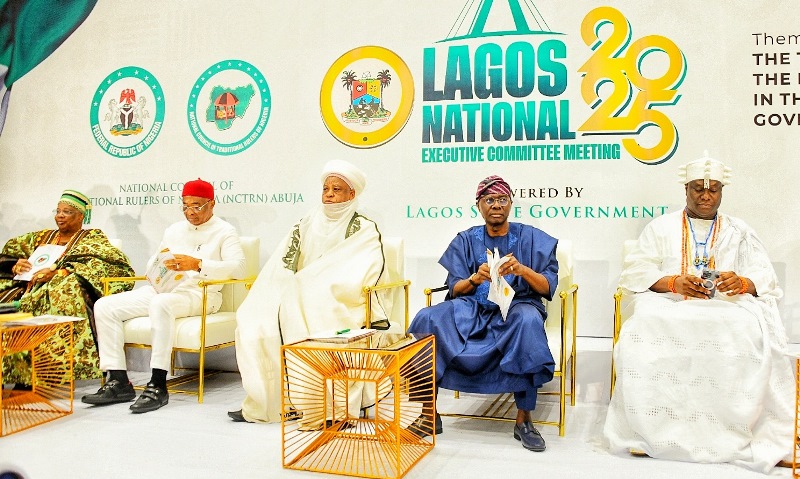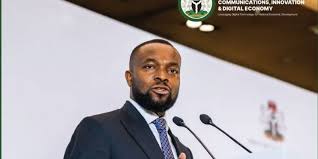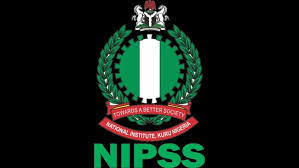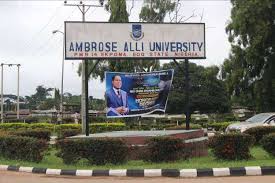
Traditional rulers from across the country gathered in Lagos on Monday to align their efforts towards engendering peace and keeping the country united.
President Bola Tinubu declared open the two-day national executive committee meeting of National Council of Traditional Rulers of Nigeria (NCTRN), the umbrella body of all traditional institutions in the country created to work with all tiers of government to promote national stability.
Governor Babajide Sanwo-Olu hosted the two-day meeting held at Lagos Continental Hotel in Victoria Island, with the theme, “The Traditional Institution: The Imperative of its Inclusion in Effective and Efficient Governance in Nigeria.”
Sanwo-Olu was joined by nine other governors, including Chairman of Nigeria Governors’ Forum (NGF), Governor Abdulrahman AbdulRazaq of Kwara State, and chairman of Progressive Governors Forum, Governor Hope Uzodimma of Imo State, who stood in for Tinubu.
The meeting was convened at the instance of the NCTRN co-chairmen, the Sultan of Sokoto, Alhaji Muhammadu Sa’ad Abubakar III, and Ooni of Ife, Oba Adeyeye Ogunwusi.
Sanwo-Olu, in his opening address, described traditional institutions as “the vital link” between the government and the people, stating that traditional rulers are the bridge connecting institutions of the state with community realities.
According to the Lagos State governor, the meeting pushed forward the need to address the role of traditional institutions in governance. He pointed out that traditional structures were respected segments of the country’s leadership system, but they were not officially empowered, despite their strong influence.
Sanwo-Olu observed that the relevance of traditional institutions diminished during the military incursion in societal politics, dealing a blow to the traditional institutions.
He said military rule significantly eroded the laudable role traditional rulers had played in shaping the country and its cherished traditions.
Sanwo-Olu said, “With the restoration of democracy in the country since 1999, our traditional rulers are gradually asserting themselves back into national consciousness. But we are not yet there. I advise that our traditional rulers continue to push for more constitutionally-backedrelevance.
“This is the right thing to do, and we promise to support this push because we believe we need to tap from the experience and wisdom of our traditional rulers to make more progress.”
He explained, “This meeting presents a unique chance to push for clarity; not for the sake of prestige, but for practical reasons. When traditional leaders are clearly woven into our governance framework, their authority can become a valuable asset for fostering peace, resolving conflicts and driving community development.
“As our nation grapples with complex social, economic, and security issues, it is crucial that we tap into the wisdom and influence of our royal fathers in a coordinated and structured way.”
Sanwo-Olu encouraged the monarchs to continue to be steadfast pillars of integrity, fairness, and unity, saying communities look to the traditional institutions not just as cultural symbols, but as moral guides.
Voices of traditional leaders, Sanwo-Olu said, held significant power when calling for peace, equity and progress. He added that their actions touched hearts and shaped futures.
“Let us collaborate to ensure that our traditional institutions stay impartial, inclusive, and in sync with the broader vision of a just and thriving Nigeria,” the Lagos State governor said.
On his part, Imo State Governor, Senator Hope Uzodimma, called for the constitutional recognition of traditional rulers in Nigeria, saying their inclusion in the country’s governance structure is both “necessary and overdue.”
He said royal fathers had been indispensable to Nigeria’s peace, stability, and moral authority, yet they remained without formal constitutional backing.
According to him, “Across this country, traditional rulers continue to carry out responsibilities essential to governance, security, and social order, even without legal recognition or formal appreciation. Their exclusion from the constitution is a gap that must be filled.”
The governor recalled that under the 1963 Republican Constitution, traditional rulers had well-defined roles within the regional and national legislative frameworks, from the House of Chiefs in the Northern Region to similar structures in the East, West, and Mid-West.
“They were not mere custodians of culture,” he said, “but constitutional actors with formal duties within the architecture of regional governments.”
Uzodimma lamented that the recognition was lost with the 1979 Constitution, and not restored in the 1999 Constitution, leaving traditional institutions “introduced into informality” and dependent on the discretion of political authorities.
“This is not a question of nostalgia,” he stressed. “It is about institutional memory and fairness. Traditional rulers are still performing constitutional functions without constitutional protection.”
The Imo State governor cited Ghana, South Africa, and Namibia as examples of African countries that had constitutionally entrenched their traditional institutions, balancing modern democracy with indigenous governance.
He said, “Ghana’s 1992 Constitution guarantees the institution of chieftaincy, while South Africa’s Constitution recognises traditional leadership in Chapter 12. Namibia also embeds the Council of Traditional Leaders in its national framework; if they can do it, why not Nigeria?”
Uzodimma urged the federal government and the National Assembly to “correct this constitutional omission” by granting traditional rulers’ legal status within the governance system, even if only to formalise their long-standing advisory and mediatory roles.
He further advised the traditional rulers to maintain neutrality in national politics, warning that partisanship could erode the trust and respect their thrones command.
He said, “You do not serve a party; you serve the people. Neutrality is not a weakness. It is a strength that gives credibility to your council and dignity to your institution.”
He likened the relationship between government and traditional institutions to “a long-standing union without a marriage certificate,” insisting that legal recognition would simply “formalise what already exists.”
Uzodimma urged Tinubu to convene a joint meeting with the leadership of the National Assembly and the governors’ forum to fast-track the process of constitutional recognition.
The event was well attended by top traditional rulers from across the country, including the Sultan of Sokoto, who also doubles as the Chairman of NCTRN, Alh. Muhammad Abubakar, the Ooni of Ife, also the Co-Chairman of NCTRN, alongside other members of NCTRN, who all applauded Uzodimma’s stance as “timely and courageous” in strengthening Nigeria’s governance fabric through inclusive recognition of indigenous authority.
Other state governors in attendance were Edo State Governor, Monday Okpebholo; Sokoto State Governor, Ahmad Aliyu Sokoto; Kebbi State Governor, Nasir Idris; Kogi State Governor, Ahmed Ododo; Cross River State Governor, Bassey Otu; Ekiti State Governor, Abiodun AbayomiOyebanji; Kwara State Governor, Abdulrahman Abdulrazaq; Katsina State Governor, Dikko Umar Radda and Yobe State Governor, Mai Mala Buni.
Sunday Ehigiator



